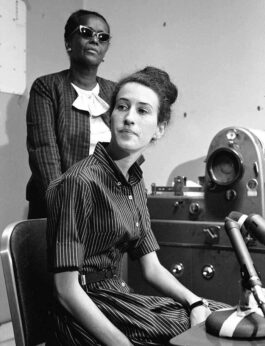
 On June 21 a jury of nine whites and three Blacks in Philadelphia, Miss., convicted octogenarian and former Ku Klux Klan leader Edgar Ray Killen of manslaughter, exactly 41 years after the triple slaying of young civil rights workers James Earl Chaney, Andrew Goodman, and Michael Schwerner.
On June 21 a jury of nine whites and three Blacks in Philadelphia, Miss., convicted octogenarian and former Ku Klux Klan leader Edgar Ray Killen of manslaughter, exactly 41 years after the triple slaying of young civil rights workers James Earl Chaney, Andrew Goodman, and Michael Schwerner.
The 1964 murders, depicted in the movie “Mississippi Burning,” brought national and international attention to this small town’s history of white supremacy, but also spurred on the anti-racist cause and the civil rights movement.

The three youths — one African American and two whites, all in their early 20s — were activists in the “Mississippi Freedom Summer” campaign, a civil rights initiative to register African American voters in the Deep South. According to a transcript of testimony by James Jordan, a Klan member who turned government witness, Killen told a group of Klansmen that the three youths had been arrested by local police and ordered the men to “pick them up and tear their butts up.”
The bodies of the three were found buried in an earthen dam 44 days later.
Ben Chaney, younger brother of James Earl Chaney, greeted Killen’s conviction and thanked the prosecutors, but cautioned, “There is more to be done.” He told the Los Angeles Times earlier this year, “They are going to use the most unrepentant racist as the scapegoat, leave the others alone because they are more powerful, more wealthy and more influential, and then move on.”
At the annual memorial to the three youths in Philadelphia’s Neshoba County the weekend before the verdict, several speakers asked, “Why only Killen?” They said more people were complicit in the crime and pointed to at least eight men who previously faced federal charges of conspiracy to deny civil rights or other charges in connection with the case. Although four of the men were convicted of these lesser charges, all are alive and should be prosecuted for their role in the murders, the activists said.
In addition, the activists said there were at least eight other bodies found when the FBI was looking for Chaney, Goodman, and Schwerner, and demanded federal and state authorities investigate those murders and prosecute the guilty parties in those cases, too.

“Preacher Killen didn’t act in a vacuum,” said Schwerner’s widow, Rita Schwerner Bender. While welcoming the verdict, she said others should also be held responsible for the slayings. She said the state of Mississippi was complicit in the crimes, and all such cases of that era should be reopened.
Some people at the trial expressed disappointment that the jury convicted Killen only of manslaughter, not murder. As things stand, Killen faces up to 20 years in prison for each of the three counts.
In a related development, earlier this month the FBI exhumed the body of Emmett Till, a 14-year-old Black youth from Chicago whose lynching in 1955 in Tallahatchie County, Miss., for allegedly whistling at a white woman, helped galvanize the movement for civil rights. Till’s mutilated body was attached to a heavy metal fan and dumped in the Tallahatchie River.
In a sham of a trial, the two white men who killed Till were acquitted. One of them later confessed to the crime in a 1956 Look magazine interview. Both men have since died.
The reopening of the Emmett Till case, as well as the conviction of Edgar Ray Killen, spotlights a time not too long ago when the killing of Black people was considered inconsequential. The cases also serve as reminders of many racially motivated murders that remain unsolved.











